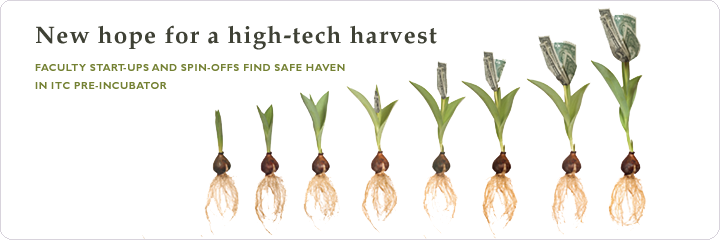
Seeds of economic diversity, vitality and growth are germinating on the second floor of Binghamton University’s biotechnology research building at the Innovative Technologies Complex.
There, administered by the Office of Technology Transfer and Innovation Partnerships, the University’s new Start-Up Suite is filling up with nascent companies, rooted in the invention and industry of faculty and graduate student researchers, and working to commercialize discoveries in the life sciences and enabling technologies. “I think it’s astonishing that at the end of the last fiscal year [2005-06], the University had seen the start-up and continued operation of seven companies that depend on technology that was generated here,“ said Eugene Krentsel, director of technology transfer and innovation partnerships. “For a school this size, this is amazing.“ Not all of the University’s spin-off companies, the ranks of which had expanded to nine at the time this article was written, are located in the Start-Up Suite in the life-sciences research building at the ITC. Only companies with a direct relationship to life-sciences research are eligible to be considered for space in the new facility.
And while not all University spin-offs are still located in the Southern Tier, a majority of them are, which is good news from a regional economic development perspective. “We hope these companies grow to the point where they will be launched into the community and hire people,“ Krentsel said. “That would be wonderful.“ But beyond the regional economic potential, there are other important benefits to be gained as a result of the University’s commitment to provide bright minds with outlets beyond the bounds of academe, Krentsel explained. “Part of the benefit is economic development, but the Start-Up Suite also gives us an opportunity to provide certain outlets to a particular type of faculty member we are trying to retain and attract. “Some researchers want not only to make an impact within academia, but also hope to change the world far beyond the bounds of the campus by seeing their work translated into the creation of new, marketable products, technologies or services — or by positioning their graduate students to do so,“ Krentsel said. “This is a terrific opportunity for those faculty,“ he added. More than a few new faculty members specifically inquired about or requested access to facilities such as those the Start-Up Suite provides before deciding to come to the University. Its existence can also be expected to be a key factor in making Binghamton more competitive in future faculty recruitment efforts.
“We’re talking about people who are academic stars — people we want to recruit, people everyone wants to recruit,“ Krentsel said. “And this is something we can offer to them that some other schools probably can’t or won’t.“ The Start-Up Suite, which provides low-cost space and business support services to approved, spin-off enterprises, can house up to eight new companies at a time. Already the suite is close to half-full with companies hoping to capitalize on bioengineering, chemistry and nanotechnology research done at the University.
page 1 | page 2